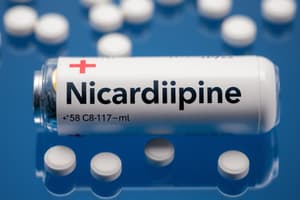Podcast
Questions and Answers
What is a critical consideration when prescribing nicardipine?
What is a critical consideration when prescribing nicardipine?
- Its dosage does not require monitoring of blood pressure.
- Caution should be exercised when combining it with medications decreasing cardiac output. (correct)
- It should only be used in oral form.
- It should be the first-line agent for all patients.
How should the dosage of nicardipine be determined?
How should the dosage of nicardipine be determined?
- At a fixed standard dose for all patients.
- Based solely on the patient's weight.
- Individually based on patient response and blood pressure monitoring. (correct)
- Only adjusted after significant side effects occur.
When might nicardipine be utilized in hypertension management?
When might nicardipine be utilized in hypertension management?
- When combined with diuretics for enhanced effect.
- As a first-line agent in all cases.
- After all other medications have been deemed ineffective or intolerable. (correct)
- Only when blood pressure is above a specific threshold.
Which of the following is a key aspect of patient education regarding nicardipine?
Which of the following is a key aspect of patient education regarding nicardipine?
What should be closely monitored when titrating the dosage of IV nicardipine?
What should be closely monitored when titrating the dosage of IV nicardipine?
What is the primary mechanism by which nicardipine lowers blood pressure?
What is the primary mechanism by which nicardipine lowers blood pressure?
Which condition is NOT a typical use for nicardipine?
Which condition is NOT a typical use for nicardipine?
What is the primary route of administration for nicardipine in hypertensive emergencies?
What is the primary route of administration for nicardipine in hypertensive emergencies?
What is a common side effect of nicardipine?
What is a common side effect of nicardipine?
What factor significantly affects the bioavailability of nicardipine?
What factor significantly affects the bioavailability of nicardipine?
Which of the following conditions requires caution when prescribing nicardipine?
Which of the following conditions requires caution when prescribing nicardipine?
What is the elimination half-life range of nicardipine?
What is the elimination half-life range of nicardipine?
What is the nature of the metabolites produced from nicardipine metabolism?
What is the nature of the metabolites produced from nicardipine metabolism?
Flashcards
Nicardipine and Cardiac Output
Nicardipine and Cardiac Output
Nicardipine should be used cautiously with other medications that can reduce heart output, as this may worsen the patient's condition.
Initial IV Nicardipine Dose
Initial IV Nicardipine Dose
The starting dose of intravenous nicardipine should be tailored to the patient's initial blood pressure and overall health.
Oral Nicardipine Dosage Adjustment
Oral Nicardipine Dosage Adjustment
Oral nicardipine doses should be adjusted based on the patient's blood pressure and any side effects they experience.
Nicardipine as Second-Line Agent
Nicardipine as Second-Line Agent
Signup and view all the flashcards
Patient Education for Nicardipine
Patient Education for Nicardipine
Signup and view all the flashcards
What is Nicardipine?
What is Nicardipine?
Signup and view all the flashcards
How does Nicardipine work?
How does Nicardipine work?
Signup and view all the flashcards
How is Nicardipine absorbed and metabolized?
How is Nicardipine absorbed and metabolized?
Signup and view all the flashcards
What are the primary uses of Nicardipine?
What are the primary uses of Nicardipine?
Signup and view all the flashcards
How is Nicardipine administered?
How is Nicardipine administered?
Signup and view all the flashcards
What are some common side effects of Nicardipine?
What are some common side effects of Nicardipine?
Signup and view all the flashcards
When should Nicardipine be avoided?
When should Nicardipine be avoided?
Signup and view all the flashcards
What are some important drug interactions of Nicardipine?
What are some important drug interactions of Nicardipine?
Signup and view all the flashcards
Study Notes
Nicardipine Overview
- Nicardipine is a calcium channel blocker (CCB).
- It is a dihydropyridine CCB.
- Primarily used as an antihypertensive agent.
- Used for managing acute hypertension.
Mechanism of Action
- Inhibits calcium ion influx into vascular smooth muscle cells.
- This relaxation causes vasodilation.
- Systemic vasodilation reduces peripheral resistance, lowering blood pressure.
Pharmacokinetics
- Rapidly absorbed orally, but low bioavailability (~30%) due to first-pass metabolism.
- Extensively metabolized in the liver.
- Major metabolites are inactive and cleared by the kidneys.
- Elimination half-life is 5-8 hours.
Clinical Uses
- Treats essential hypertension.
- Used in hypertensive emergencies (e.g., acute stroke, severe preeclampsia).
- Often administered intravenously for rapid onset in emergencies.
- Used for ischemic chest pain refractory to other treatments.
- Used cautiously in patients with severe left ventricular dysfunction or other cardiac conditions.
Administration
- Commonly given intravenously for rapid onset, especially in emergencies.
- Available in oral forms for chronic hypertension management.
- Oral administration has a slower onset of action.
Side Effects
- Common: headache, flushing, dizziness, peripheral edema.
- Less common but serious: hypotension, bradycardia, arrhythmias (especially with IV).
- Reflex tachycardia is a possible adverse effect due to vasodilation.
Contraindications
- Hypersensitivity to nicardipine or other dihydropyridine CCBs.
- Caution with severe hypotension, acute myocardial infarction, or severe hepatic dysfunction.
- Use during pregnancy and lactation only if benefits outweigh risks.
Drug Interactions
- Significant interactions with other vasodilators, antihypertensives, and medications affecting hepatic metabolism.
- Caution when combining with medications decreasing cardiac output.
Dosage Considerations
- Individualized based on patient response and continuous blood pressure monitoring.
- IV nicardipine starting dose and titration carefully adjusted based on initial blood pressure and clinical status.
- Oral dosage adjustments with careful blood pressure monitoring and adverse effect observation.
Special Considerations
- Secondary choice for hypertension management if first-line agents are ineffective or poorly tolerated.
- Patient education on potential side effects, and the need for regular blood pressure monitoring, is crucial.
Studying That Suits You
Use AI to generate personalized quizzes and flashcards to suit your learning preferences.


